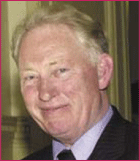| His Coordinates, Interviews | |
One should not rely on a single source for PNT information
|
||||
Would you like to explain IAIN’s purposes?Various institutes of navigation [ION] around the world came together in the 1970s to form an international association for the exchange of information and the provision of impartial advice on navigation matters. It has grown successfully, not merely in membership size but also in representation at relevant international bodies. Who are IAIN’s members?The 20 member institutes of navigation come from 29 countries, alphabetically ranging from Australia to the United States of America. Each member pays an annual subscription depending on the size of their membership roll. Nominally the largest institute is from China, with the United Kingdom following as second and the smallest member institute from the Czech Republic. How does IAIN discharge its purposes?
What thoughts lay behind your Latin navigation tag quote above?I have always grasped the fundamental necessity for most walks of life to be able to get from one location to another in order to survive, whether they be man, bird or beast. That involves navigation, albeit some of it done by instinct. Man has raised that basic level of navigation by introducing other means of transport by land, sea, air, and space. All of these have led to navigational advances over the centuries. Our current era of electronic navigation (e-nav) has brought remarkable positioning, navigation, and timing [PNT] capabilities to a wealth of users. Many of those users will not know how they are provided with such information, but nonetheless they will rely, unconsciously, on navigation. They indeed will depend on ‘The New Navigators’, an expression coined elsewhere, to safely design and sensibly produce a myriad of electronic devices. Institutes of navigation can help by providing the fora for keeping the professionals up-to-date and also by informing lay users of system’s general capabilities and limitations. Do you have any concerns about the enav era?No more than any other prudent navigator. Essentially, one should not rely on a single source for PNT information. Always use other navigation aids to double check and provide the necessary, but probably temporarily, back-up when the primary source fails. And, as ever, keep a sharp lookout by all means available! Electronic navigation, especially spacebased, has enhanced many human activities and is to be welcomed! Does IAIN have a strong Asian membership?We do indeed. Japan, South Korea, and China have been members for some years and play a full part in IAIN proceedings. North Korea has joined recently. There do not appear to be institutes of navigation in other Asian countries. However we would encourage and can advise on the forming of institutes. The essential criteria are membership of an institute open to all and a constitution that embraces all forms of navigation. Too many people still cling to the ancient notion that navigation concerns ships and mariners when in fact it involves transport over land, in the air, and in space. Some newer members have difficulty in bringing these different modes into one institution or conference, even though GNSS is increasingly common to them all! Which direction is the GNSS technology moving?Undoubtedly towards greater accuracy, integrity, and compatibility between the various systems; this is a most welcome development. Chips already exist that will process GPS/ GLONASS/Galileo together. It never ceases to surprise me what new uses or applications are being made of GNSS. What are the main emerging areas for GNSS technology?Whilst all applications would like to see more satellites, the areas of explosive growth are on the land – vehicle and pedestrian. It is these users who need the benefit of more satellites and hence will be using more than one constellation. Interestingly, it is also on land that integrity is becoming more in demand, even at a basic level, with the imminence of insurance premiums calculated by the mile (already started by Norwich Union) and road user charging (under serious consideration in several countries). Railways are also keen on GNSS to get more trains on the tracks, where continuity and integrity are vital. By and large the sea and air are pretty happy with what they have but will take advantage of GNSS improvements. Do you feel that there are issues that need to be addressed to accelerate the growth of this technology?There is the underlying tricky situation arising from the difference of the provision of a free GPS service to users, and the planned charges by Galileo for users of certain services. This may well hamper the growth of Galileo for financial reasons. There are also political issues that can arise, even between cooperating nations which have the potential to delay progress. How do you see the emergence of Galileo?Undoubtedly, I see it as a complement, as well as indeed a compliment! The addition of another constellation will do much to enhance the overall value of GNSS to many users around the world. Galileo, as a project, has also done much to stimulate the whole arena of satellite navigation. I have also been impressed by the willingness of existing GNSS system providers, especially GPS, to co-operate with Galileo in achieving compatibility with the emerging new system. Captain RA SMITH was previously Secretary General of IAIN, Chairman of the European Group of IONs and President of the Royal Institute of Navigation. He spent 35 years in the Royal Navy, mostly at sea. He is a Younger Brother of Trinity House, Fellow Royal Institute of Navigation, Fellow of the Nautical Institute, Fellow Chartered Institute of Management, lay member of the Institute of Chartered Accountants of Scotland and Fellow Royal College of Physicians of Edinburgh. He hastens to add that the latter is in a nonmedical category! He has recently been nominated as a member of the US Spacebased Position, Navigation and Timing Advisory Board. |
||||












 (No Ratings Yet)
(No Ratings Yet)




